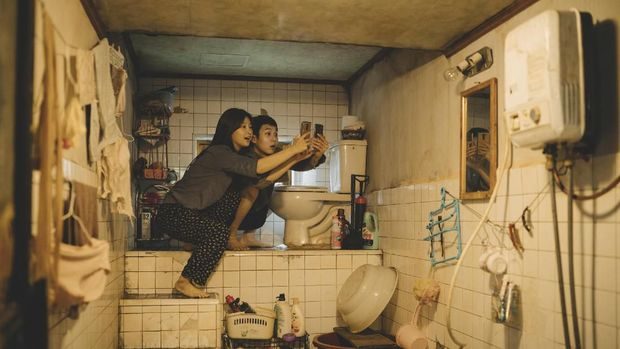“Parasite”: The best Korean movie in Indonesia
The success of the film Parasite in South Korea seems to be contagious also in Indonesia. This film by famous director Bong Joon Ho is a best-seller from the Land of Ginseng in Indonesia.

(Dok. CJ Entertainment/Korean Film Council)
Jakarta: South Korea’s pop music (K-pop) and drama are not the only ones that began to assert themselves in the entertainment scene in Indonesia. Korean widescreen films have also started to attract the interest of Indonesians. Parasite was aired in Indonesian theaters on July 14, but within six days, it has been watched by more than 380,000 people, making it the best-selling Korean film of all time in the country. Such a figure is phenomenal, especially that the film was screened only in cinema networks that are not the biggest players in Indonesia.
Until now, it is still screened in a number of CGV and Cinemaxx theaters. Parasite has won the highest award of Gold Palm at the 2019 Cannes Film Festival. The film defeated Once Upon A Time in Hollywood by famous director Quentin Tarantino that was eagerly awaited by critics. In its home country, Parasite had 8 million viewers in just 17 days. The world was shocked when Parasite was awarded the Gold Palm at this year’s Cannes Film Festival. It also won the Best Film at the Sydney Film Festival, while Bong Joon Ho was named the Best Director at the 2019 International Cinephile Society Awards.
The plot of Parasite begins in the ground of a rundown apartment. There lived an unemployed former driver Kim Ki-taek (Kang-ho) and his wife, Choong Sook (Hyae-jin). The couple has two children, Kim Ki-Woo (Woo-sik) and Kim Ki-jung (So-dam). One day Ki-Woo meets a friend who recommends that he work for Park (Sun-kyun) and his wife, Yeon Kyo (Yeo-jeong). Ki-Woo eventually became Park’s private English teacher. Armed with a fake diploma, Ki-woo introduces himself as Kevin. He then recommended his sister to teach Park’s youngest child, hyperactive Park Da-song (Hyun-joon). Ki-jung tricks Park into disguising herself as Jessica. Large salaries make Ki-Woo and Ki-Jung compose scenarios so that their parents can work for the Park family. Jessica trapped Park’s personal driver and slandered Park’s household assistant, Moon-gwang (Jeong Eun-Lee). The Ki-taek family’s lies lead to unexpected consequences.
Parasite is capitalized on a solid script that Bong Joon Ho executed in detail. He used a number of properties as a teaching aid to be shared. For example, the stone of luck that at a glance changes the financial condition of the Ki-taek family, the blinking of lights, the location of the house, including the contrast of the conditions of the two families as a form of social criticism. Presenting the polemic of the rich and the poor, Parasite did not get caught up in the melodrama of the different castes or businesses that changed the situation. The emphasis of the film lies in choices, opportunities, and consequently, plans or no plans to minimize disappointment, and not ready to get rich. This theme is presented in dark comedy that offers laughter but moves the conscience. The first round was the success of the Ki-taek family to turn around a situation full of laughter. The unexpected arrival of guests when the employer left the house marks the second round that implies the transition phase from concentrated comedy to thriller. The final round presents the climax following realistic misappropriation.
We face the question posed by the main character: “Is it true that I am in this (rich) environment?” Everyone wants to be rich or at least well off. However, to achieve that, people need higher education and must hard work. Ethics when life is established and choices made in the middle of the road really determine whether or not we are at the final destination. Bong Joon Ho, who also manages the manuscripts, understands that he really wants to be taken where the film is and how the character of the Ki-taek family members must be formed. Ki-woo’s character is beautifully executed by Woo-shik. His innocent face makes us understand why he is easily loved. He becomes evil because he abuses opportunities and is led by circumstances. Senior actors Kang-ho and Hyae-jin appear charming through deft gestures, such as in the scene when Hyae-jin kicked the ex-housemaid while providing instant ramen to the very hilarious employer. But we can’t forget Kang-ho’s expression when philosophizing that the most perfect plan in life is not having a plan. On his face, there was despair. At the same time and on the same face, we see the awareness of the need to continue living as hard as anything.
Unusual themes developed in intelligent dialogue and tasteful humor are played out by actors who know how to really turn on powerful figures without being trapped in a theatrical or karmic style. This is what makes Parasite knock on conscience in many moments. The film’s main theme is a criminal comedy based on social criticism. In the middle of the road, there is a love story wrapped in a theme “friends eat friends.” However, it is thin and not too sweet, so it does not mess up the main topic. All characters appear with strong reasons based on a solid script. This makes Parasite enjoyable and can be watched more than once. There are many points of view about life, family and dream pursuits that cannot be instant. The end of the film is deceiving, making us laugh because we feel cheated. If you want to be honest, that’s how life is. We make beautiful plans. When the plan is completed, we face the hardest part: the process of execution expected to live up to the dream.
























































